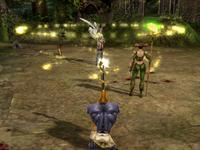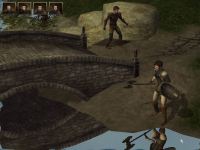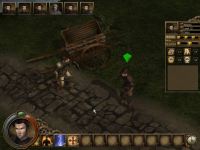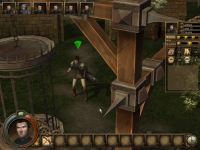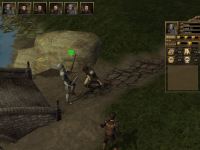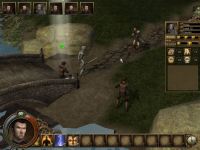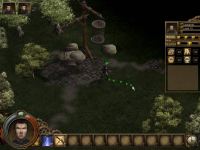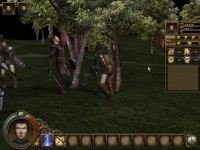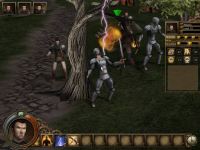|
Tactica Online Interview
Brian 'Dhruin' Turner, 2005-04-06 
There can be little doubt that the online market is crowded - with behemoths like Sony Online, NCsoft, Turbine and Blizzard commanding huge market share and an uncountable number of independent projects battling for attention, it's easy to get lost in the crowd. And yet, despite this - or perhaps because of this - the EverQuest model dominates the market, with very few projects willing to take a truly different approach. Enter Imaginary Numbers with Tactica Online, which turns just about every paradigm in the online market on its head.
Tactica Online's party-based play with genuine turn-based tactical combat and an emphasis on strategic team-building is unique. Imaginary Numbers promises an evolving story-line within the European renaissance setting that blends history with fantasy and game mechanics designed to eliminate level grinding -- and place the emphasis on player skill. We had the chance to send some questions to Imaginary Numbers' founder and CEO Luke Carruthers to find out more about this intriguing game.
RPGDot: Please introduce yourself and tell us a little about Imaginary Numbers
Luke Carruthers: My name is Luke Carruthers, and I'm the CEO of Imaginary Numbers. Based in Australia, we're a year-old studio formed by a group of developers who think that online games are all a little too similar right now, and want to do something about it.
RPGDot: Can you give our readers an overview of Tactica Online?
Luke Carruthers: The high concept: turn-based tactical combat in da Vinci's world. Science, magic, and faith clashing to determine the future of mankind. Alchemy, angels, and black-powder muskets on the battlefield.
The gameplay: you control a squad of characters, customized as minutely as you want them to be, carrying out missions revolving around that tension between science, magic, and faith. Combat is extremely tactical - if you don't actively respond to your opponents' tactics, you're going to get beaten - with an emphasis on combos of skill effects, similar to a collectible card game like Magic: The Gathering.
Designing the squad you take on these missions is a sub-game in itself, for those who want to participate. Getting just the right combination of skills, creating new effects, mixing things in a slightly different way to tweak a common squad design for that little bit more, or just trying out something different for a change.
RPGDot: Many observers feel the online market is rather crowded and there have been several high-profile cancellations over the last year or so. Tactica Online takes a very different approach to traditional MMOGs, which must add some risk but gives you a unique position. How do you see the market and how Tactica Online fits in?
Luke Carruthers: That different approach is very deliberate, precisely because the market is so crowded.
We don't really fit into the market as it stands: we have a different business model, based around expansions rather than subscriptions; we have different gameplay, as much a strategy game as an RPG; you control a squad of characters rather than a single avatar; combat is turn-based rather than realtime; and a dozen more.
We think this is an advantage. While the market for real-time RPG's is probably larger, we'd rather be the only game in a smaller niche than fighting for visibility amongst the crowd.
RPGDot: You've chosen a semi-historical setting in renaissance Europe, around the time of da Vinci. Can you elaborate on this setting and why you chose it? What sort of world have you created in terms of magic, technology, weapons and so forth?
Luke Carruthers: Da Vinci's time is a great setting for a game. The New Sciences are disrupting almost every facet of life, and there's intrigue between the Church and just about everyone else. The different groupings of beliefs - science, magic, and faith - are still relevant to us today. Primitive guns were starting to make an impact on the battlefield, so there are several differences from the more common high fantasy setting. It's an incredibly fertile environment to tell stories in.
Tactica Online's world is drawn closely from the historical Renaissance. It's full of secret societies, hidden knowledge, venal priests and power-mad mystics, but it's different to our Renaissance in a few fundamental ways - alchemy works, the presence of angels is inarguable, and da Vinci's machines are not just sketches but an everyday fact of life. It's common for knights to use guns as well as swords, and just as common for an alchemist to cause an enemy to explode in flames. Exploring the changes these differences could make in the development of history is going to be part of the fun.
RPGDot: One of the major ways Tactica Online differs is players create and control parties or teams rather than one individual character. First, what sorts of options do players have in creating characters? What sorts of choices are available in terms of classes or archetypes, skills, appearance and so on?
Luke Carruthers: There's almost total freedom when it comes to creating characters. Any character can choose any skill, and a large part of the game is designing characters that work well with each other to create an effective squad. That character's class is a function of the skills they know and the equipment they use.
All this freedom can be a bit confusing, so there are templates to start you out, but the progression is designed to gradually ease you into things. As to specifics, there are six lines of skills: Melee, Ranged, Hunting, Lore, Research, and Doctrine. Each has seven Basic skills, which are generally easy to use; seven Elite skills, which take a bit more thought to be effective; seven Enhancements, passive skills which give different types of bonuses; and seven pieces of special equipment, most of which revolve around powerful, but hard to execute, combos.
RPGDot: What about character development? How does the experience system work?
Luke Carruthers: Players receive experience as a reward when completing missions. This experience is put towards modifying characters - because you start out with a fully-developed squad, you don't so much level up as simply change your capabilities. Experience is relatively easy to obtain, and even casual players will be able to fully customize their squads.
Completing certain missions will also give you more skills and equipment with which to customize your characters, as well as draw you deeper into the story.
RPGDot: Combining characters to create effective teams appears to be one of the primary challenges for players. Your website alludes to multiple teams - can characters and teams be created at any time? Is there a limit to the number of characters or teams a player can hold? How many characters can be in a team?
Luke Carruthers: Absolutely, designing effective teams is a whole sub-game in itself, and one we expect some players to focus on.
Players can create characters and teams at any time, almost without limit. One of the fun things about the game is playing with different squads, testing out a new idea on how to combine certain skills, and so we want people to be able to experiment as widely as they'd like to.
There are no limits to the number of characters in a team, except that set by the maximum number of points allowed for a mission. Determining the number of characters you want is a tactical decision in itself. Some sorts of teams will be better with fewer characters, some with more.
RPGDot: Another major departure for the genre is turn-based combat. Can you describe the combat system? How do you balance (or even achieve) "fast-paced" combat with this system?
Luke Carruthers: This is the $64,000 question, isn't it? Like most turn-based systems, combat is a sequential set of moves by each character. Characters, rather than players, take turns according to initiative, so part of the reason things move quickly is that there is usually only one or two actions before the next player gets to take another action. Each action is a simple thing - fire at an enemy, move there and set a trap, desecrate the pagan altar - it's only in combination that actions become complex, so usually it's ten to 15 seconds between turns.
Each player has a time limit for all moves combined, often around ten minutes but depending on the mission, and they lose the battle if their time limit is reached, so there's an incentive to be quick as well.
Of course, there's no shortage of things to do while your opponents' characters are moving - you're checking options, assessing the changing battlefield, and modifying your strategy to take account of your opponents' moves - which adds to the sense of things moving quickly.
None of which says anything about balance. A wide open skill-based system like this needs a lot of work on balance. We've been testing internally for a while, and we'll be expanding that to public testing in the next couple of months. We have a powerful tool to help us achieve balance in the points system - if a skill is too powerful, it's easy to make it cost more to bring it back to where it should be, for example - and we expect to be refining things all the way through to release, and even beyond if necessary.
RPGDot: Jagged Alliance is mentioned as one inspiration - are there any similarities in terms of the strategic depth during combat? What about advanced options like using cover or terrain and so forth?
Luke Carruthers: Absolutely. Testing has shown us that using terrain well is one of the things that distinguishes good players from mediocre ones. The depth of the combat system is one of the reasons we love those old turn-based games, and the most important thing we wanted to achieve with Tactica Online's combat.
This is part of the reason we draw upon the underlying systems used by collectible card games. Besides classics like chess and poker, I don't know of any systems with as much inherent depth as the combination-based systems used by CCG's.
RPGDot: Can you describe the general gameplay? How do players access quests or missions and what sort of quests will they encounter? Can players freely explore the world or are areas mission-based? Where does instancing come in?
Luke Carruthers: Taking time out of their chatting, trading, visiting guild houses, and designing squads, players can visit NPC's in the shared areas of the world to receive missions. These missions all take place in instanced areas. They could have objectives as simple as kill every opponent, or as complex as cause an experiment to fail.
Either way, how you complete each objective is up to you: stealth, traps, simple full-on assault, devastating combo's that take time to assemble, distracting your enemy with most of your characters while one slips past to the objective, there are dozens of different ways to get things done.
It's worth noting that the shared areas of the world aren't about geographic exploration, they're about being able to interact with other players outside combat. In fact, Tactica Online doesn't feature a lot of geographic exploration at all - it's a common feature of online RPG's, you can get that sort of fun anywhere, so we'd rather focus on other sorts of gameplay that aren't so available. I'm careful to focus on geographic exploration here, because exploration of the game mechanics is strongly rewarded, and something we'd like to encourage a lot of.
RPGDot: According to your website, all combat is against other players. How is this achieved within the mission structure and how do players come to be in opposition? Is it based on race or faction?
Luke Carruthers: Many missions grow directly out of the storyline, based on what players have done, or the state of the world. Players don't choose a faction to represent though, instead having their allegiances based upon their deeds, and how they accomplished them.
Most missions have a large number of "opposing missions" that can be matched against them - these are missions that have an opposing objective (save an NPC/kill an NPC, for example).
When a player takes a mission, they can choose to either go on it immediately, or put it aside for another time. Either way, when they decide it's time to undertake that mission, the game matches them against another player who is taking one of the opposing missions at the same time. This creates a structure where for a player to win, their opponents must lose, while at the same time ensuring an abundance of opponents.
RPGDot: Tactica Online has some interesting ideas to achieve balance and avoid level grind, such as having point-values for each mission and rankings for players. Can you expand on these plans?
Luke Carruthers: Endlessly :) The point system is the heart of both balance and the level playing field concept. Every skill and piece of equipment has a point value, carefully assigned after long hours of testing. The sum of these make a character's point value, and the sum of the member's point values give a squad a point value. Each player can only take a squad of a certain number of points into each mission.
You start out with a squad the equal of any other player, meaning there's no grinding required to get to a position where you're able to compete, and no more gank squads ruining other people's fun.
Of course, with player skill being the determinant of victory, if you're not as good as someone else, they'll beat you every time, and while you might be getting better and better with each match, you're probably not enjoying it too much. To prevent this, every player has a rating - we use the same system chess does, the Elo system - and you're only matched with players close to your rating by default.
RPGDot: Although level grinding is universally decried, there's no doubt levelling forms a key part of the appeal of games like EverQuest. With multiple characters and teams and the ability to respec as desired, is there a danger of losing that addictive connection to an individual character?
Luke Carruthers: There are many more ways to personalize your characters than most online RPG's offer, both through direct choices and the actions your character takes within the world, but I think it's more likely players will form an attachment to a squad than a character.
Equally, Tactica Online has plenty for players to achieve - ratings, successfully completing missions (which give you access to powerful equipment as well as new skills), Tournaments and Campaigns that determine the progress of the story, and more - so there's no shortage of targets for players who like to approach a game that way, but you aren't doing the same thing over and over again to achieve these targets.
At the end of the day though, our challenge is to make the fun you have going through the process as addictive as the fun that comes from achieving the goal.
RPGDot: Your website refers to the ability of players to change or influence the story and gameworld. How will you implement this, in practice? How important is the story to the actual gameplay?
Luke Carruthers: The story is incredibly important. I've already mentioned that one of our goals is to explore how slightly advanced technology and the reality of magic would affect European history. Everything grows out of the tension between science, magic, and faith - the story, the setting, missions, and even the skills available.
There are several ways that players impact the story. Indirectly, the success of teams favoring a particular faction will affect that faction's success in the storyline. If the armies of faith are particularly effective, the storyline will show the faithful growing in influence.
Directly, every story arc culminates in a big event that reflects what's happening in the story at the time. This event will usually have a Tournament associated with it, the winner of which will be able to choose the outcome of the event - whether Leonardo da Vinci will be assassinated, for example, or perhaps whether a telescope powerful enough to view heaven is built.
RPGDot: Tactica Online has no monthly fees but you plan to release regular expansion packs. Why did you decide on this model and what can we expect from the expansion packs?
Luke Carruthers: Tactica Online's expansion sets are intended to be more than just traditional expansion packs. As well as the usual more areas to adventure in, more missions, and more weapons, expansion sets will change the way the game is played. Each includes some 40-odd new skills, changing the competitive landscape. Some squad designs that worked well before won't work at all, some won't be affected, and some will work better. It's the same game, same rules, but you have to re-evaluate your tactics in light of the new capabilities other players will have.
Similarly, each expansion set moves the story forward. The new skills and missions introduced reflect the changes that players have caused in the world around them, but more importantly, each expansion set culminates in an event that players determine the outcome of, giving you an active influence on the world.
This model was driven by the desire to support casual players, as well as those who don't necessarily want to give up their existing online game, but can't justify paying a second subscription fee. If you're spending ten to twenty hours a week playing a game, $15 a month is easily justified, but if you have a job that takes long hours, you only get to play a few hours a week, $15 a month is a bit harder.
Similarly, with the variety of online games available now, you don't want to be limited to just one or two, but the subscription fees start to add up. We wanted people who only played a few hours a week to feel comfortable doing so.
RPGDot: Is there anything you would like to add in closing?
Luke Carruthers: The other thing I'd like to mention is guilds. While Tactica Online has lots of solo gameplay, there's also lots of support for guilds to play together. Guilds are immensely important for any online game, and we've put a lot of effort into making the guild experience a good one - an extensive set of tools to manage your guild, the ability to share experience, equipment, and even characters, guild missions and Tournaments that put you up against rival guilds, teams where each character is controlled by a different player, guild ratings, and much more.
RPGDot: Thank you!
Luke Carruthers: Thanks for the opportunity to talk about our favourite game!
Links:
Tactica Online
Imaginary Numbers
|




